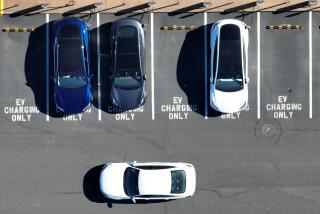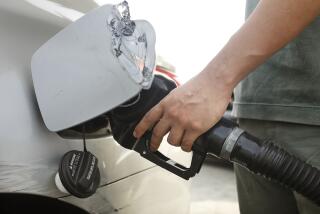Two for the Price of One : Why a gasoline tax could pump up both conservation and deficit reduction
- Share via
President-elect Bill Clinton’s opposition to increasing the federal gasoline tax may be softening under urgings from key members of his transition team and incoming Administration, as well as from prominent economists and business participants in last week’s Little Rock economic conference. A boost in the tax is, in fact, needed as well as long overdue.
Adjusted for inflation, U.S. gasoline prices are lower now than at any time since the 1973 Arab oil embargo led to the first of a number of massive OPEC-dictated boosts in crude oil prices. A carefully drawn tax hike, perhaps with offsetting tax reductions elsewhere to help out those least able to afford it, could probably pass a Congress whose typical reaction over the last two decades has been to recoil in political horror at the idea of raising any fuel taxes.
Increasing the current 14.1-cent federal gasoline levy--even by as much as the phased-in 50 cents that Ross Perot advocated during his presidential campaign--would still leave U.S. motorists paying significantly less at the pump than their counterparts in most other major industrialized countries. Right now, gasoline in Western Europe and Japan typically costs two to three times the U.S. average.
Americans who dislike taxes--and who does not?--are of course unlikely to be impressed by what foreigners must pay for fuel. But Americans, so the polls say, are also growing increasingly and justifiably worried about chronic and massive federal deficits and the inexorably rising percentage of each tax dollar that goes simply to pay interest on the national debt. An increase in the gasoline tax won’t lead to dancing in the streets, but with a little educational effort it could be made more politically palatable.
At current consumption rates, each 10-cent increase in the gasoline tax would bring the Treasury a little more than $10 billion in added revenues. It would make sense, in order to make higher taxes easier to accept, to earmark the new revenues for job-creating projects to rebuild the aging road transportation infrastructure. Even marginally higher taxes would somewhat reduce demand. Subsidiary benefits of lowered consumption would include reduced air pollution and an improvement in the nation’s trade balance as oil imports fell.
Clinton says he remains firmly opposed to any “excessive” increase in the gasoline tax, but he has left the door open to some boost if those who would be hit hardest by it--including motorists in Western states who must drive long distances--would not bear a disproportionate burden. Taxes and cuts in federal spending are the only two ways the deficit can be brought down. Clinton should be ready early on to go for a boost in gasoline prices.
More to Read
Get the L.A. Times Politics newsletter
Deeply reported insights into legislation, politics and policy from Sacramento, Washington and beyond. In your inbox twice per week.
You may occasionally receive promotional content from the Los Angeles Times.










